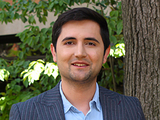Talk: Applications of Quantum Computing and Optimization in Cybersecurity
12–1pm EDT, Friday, October 17, 2025, online
Applications of Quantum Computing and Optimization in Cybersecurity
Mohammadhossein Mohammadisiahroudi
Math/Stat Department, UMBC
Joint work with Zeguan Wu, Brandon Augustino, Tamás Terlaky, and Giacomo Nannicini
12:00 noon–1pm, Friday, October 17, 2025, WebEx
Quantum computing has emerged as a transformative computational paradigm capable of solving certain classically intractable problems exponentially faster. Among its groundbreaking developments, Shor’s algorithm demonstrated an exponential speedup for integer factorization, posing a potential threat to existing cryptographic systems and highlighting the disruptive impact of quantum computing on cybersecurity. Quantum computing, however, also presents opportunities to strengthen cybersecurity by enhancing optimization and information-processing capabilities. In this talk, we explore the intersection of quantum computing and optimization, focusing on quantum algorithms that offer computational advantages in solving large-scale optimization problems. In particular, we discuss the Quantum Interior Point Method, which provides a complexity advantage for solving conic optimization problems. We further illustrate potential applications in cybersecurity and information science, such as optimization models involving entropy and relative entropy cones, demonstrating how quantum optimization techniques can contribute to secure and efficient cyber-infrastructures.
Mohammad is an assistant professor in the Department of Mathematics and Statistics at UMBC. He is also member of UMBC's Quantum Science Institute and Cybersecurity Institute. Before joining UMBC, from 2024 to 2025, he was a postdoctoral research associate in the Quantum Computing and Optimization Lab at Lehigh University. He received his PhD in industrial and systems engineering from Lehigh University in August 2024. His research focuses on developing, analyzing, and implementing efficient quantum and classical algorithms for solving large-scale optimization problems arising in various applications, including machine learning, healthcare, and cybersecurity. His work has been recognized with the 2025 Pritsker Doctoral Dissertation Award from Institute of Industrial and System Engineers, the 2023 INFORMS Computing Society Best Student Paper Prize, and the 2023 Van Hoesen Family Best Publication Award.
Host: Alan T. Sherman, sherman@umbc.edu
Support for this event was provided in part by the NSF under SFS grants DGE-1753681 and 2438185. The UMBC Cyber Defense Lab meets biweekly Fridays 12-1pm. All meetings are open to the public.
Posted: October 13, 2025, 5:48 PM
